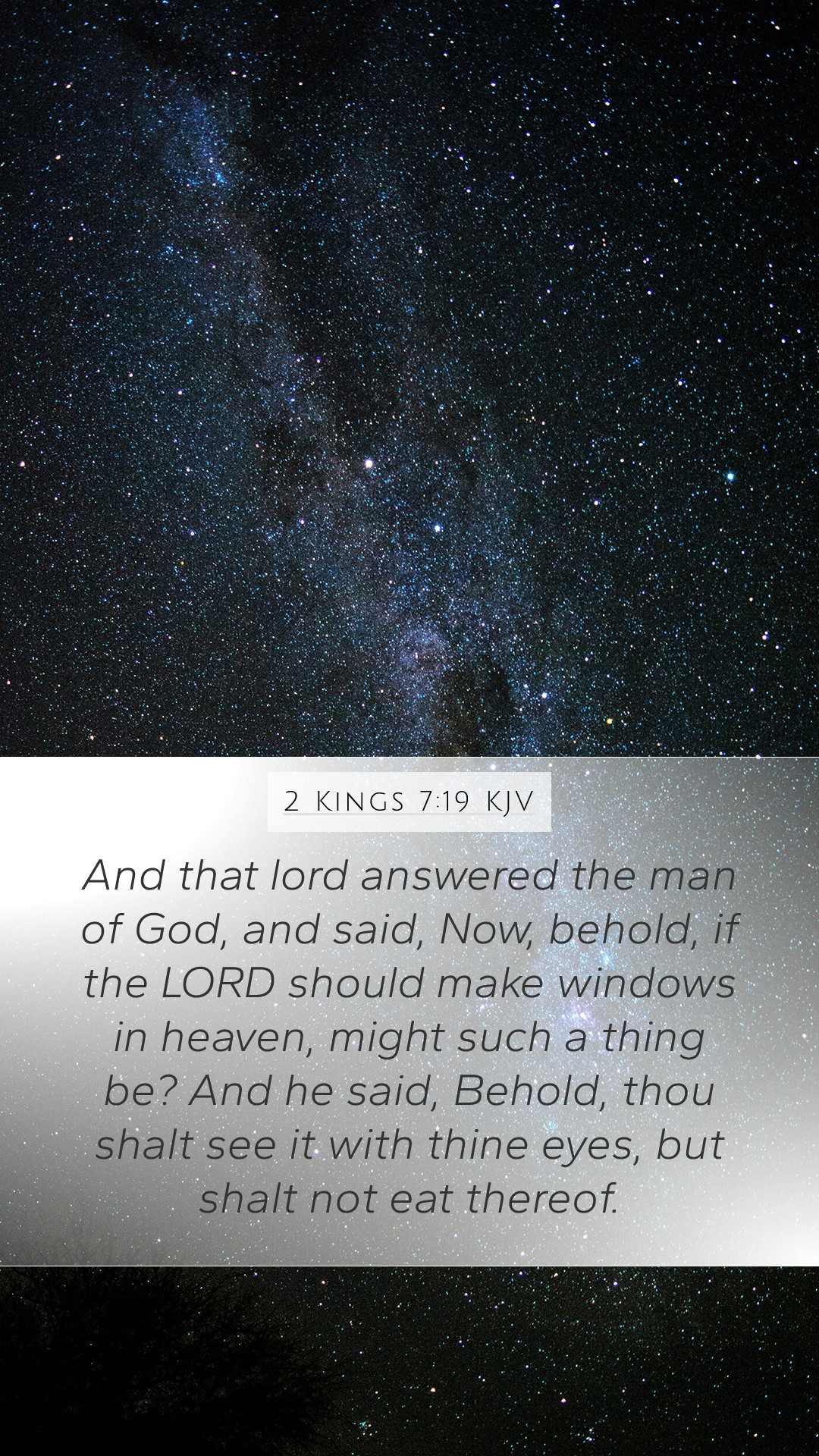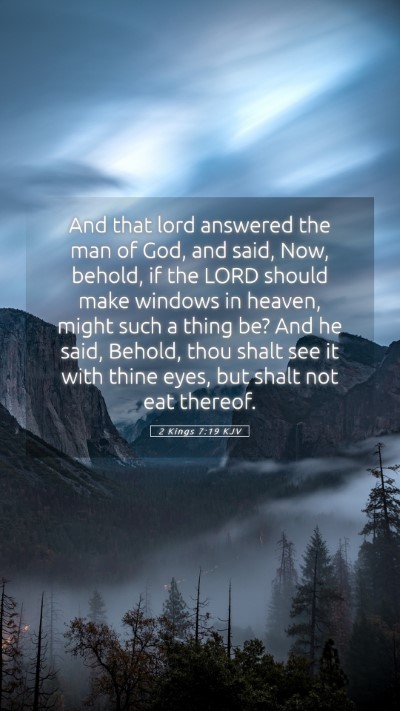Old Testament
Genesis Exodus Leviticus Numbers Deuteronomy Joshua Judges Ruth 1 Samuel 2 Samuel 1 Kings 2 Kings 1 Chronicles 2 Chronicles Ezra Nehemiah Esther Job Psalms Proverbs Ecclesiastes Song of Solomon Isaiah Jeremiah Lamentations Ezekiel Daniel Hosea Joel Amos Obadiah Jonah Micah Nahum Habakkuk Zephaniah Haggai Zechariah Malachi2 Kings 7:19 Meaning
What is the meaning of 2 Kings 7:19?
And that lord answered the man of God, and said, Now, behold, if the LORD should make windows in heaven, might such a thing be? And he said, Behold, thou shalt see it with thine eyes, but shalt not eat thereof.
2 Kings 7:19 Bible Verse Meaning
Bible Verse Meaning and Commentary: 2 Kings 7:19
2 Kings 7:19 states, "And that lord answered the man of God, and said, Now, behold, if the Lord should make windows in heaven, might this thing be? And he said, Behold, thou shalt see it with thine eyes, but shalt not eat thereof."
Overview of 2 Kings 7:19
This verse occurs during a time of great despair and famine in Israel, where the promise of divine provision is met with skepticism. The lord of the king doubts the prophet Elisha’s words, leading to a crucial prophecy regarding his fate.
Commentary Insights
- Matthew Henry: Henry suggests that the skepticism displayed by the lord illustrates the common human tendency to doubt God's promises. The verse serves as a warning against incredulity and highlights that doubt can lead to missed blessings.
- Albert Barnes: Barnes emphasizes the miraculous nature of God's interventions. He points out that the lord's response indicates a lack of faith, while Elisha’s assertion indicates that divine provision will occur despite human logic.
- Adam Clarke: Clarke discusses the significance of Elisha's words. He interprets the prophet's statement as a reflection of God’s sovereignty and the inevitability of His plans, asserting that what seems impossible to man is always possible with God.
Theological Themes
This verse is rich with themes relevant to Bible verse interpretations and Scripture analysis, particularly concerning faith, skepticism, and divine sovereignty.
1. Faith vs. Skepticism
The interaction between the lord of the king and Elisha illustrates a stark contrast between faith and skepticism. The former represents a disbelief in the divine promises while the latter stands firm in God’s word.
2. The Nature of God's Provision
Elisha’s prophecy demonstrates that God can provide miraculously, transcending human understanding. This invites readers to reflect on the meaning of Bible verses related to God's trustworthiness and capability in fulfilling His promises.
3. Consequences of Unbelief
Elisha’s foretelling of the lord's fate serves as a stark warning: disbelief may lead to missed opportunities for blessings. This theme is prevalent throughout scripture, prompting further Bible study insights into the impact of faith on our lives.
Application for Today
This scripture can be applied to our daily lives, particularly when facing challenging situations where faith may waver. It encourages believers to trust in God's promises despite circumstances that suggest otherwise.
- Practical Trust: Developing a habit of remembering God's past provision can strengthen faith.
- Community in Faith: In Bible study groups, sharing personal stories of faith can encourage others.
Related Bible Cross References
- Hebrews 11:6 - The necessity of faith in pleasing God.
- Matthew 19:26 - The impossibility of what man considers impossible.
- 2 Peter 3:9 - God's promises are always fulfilled in accordance with His timing.
Conclusion
The passage in 2 Kings 7:19 serves as a powerful reminder of the importance of faith in God's promises and the consequences of doubt. It highlights key themes of Bible verse commentary, providing profound insights into how we understand and apply scripture in our lives today.


